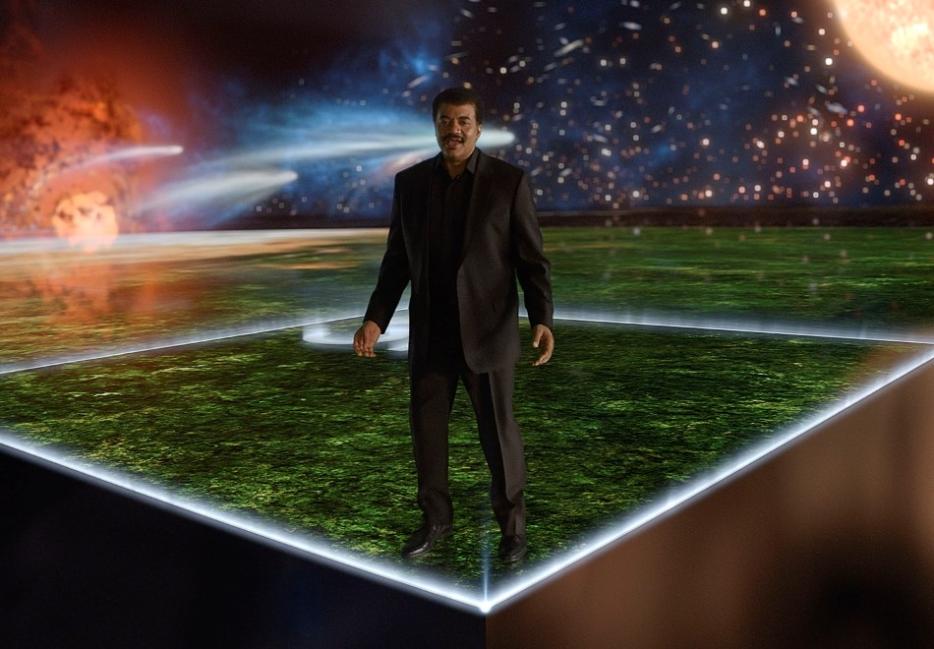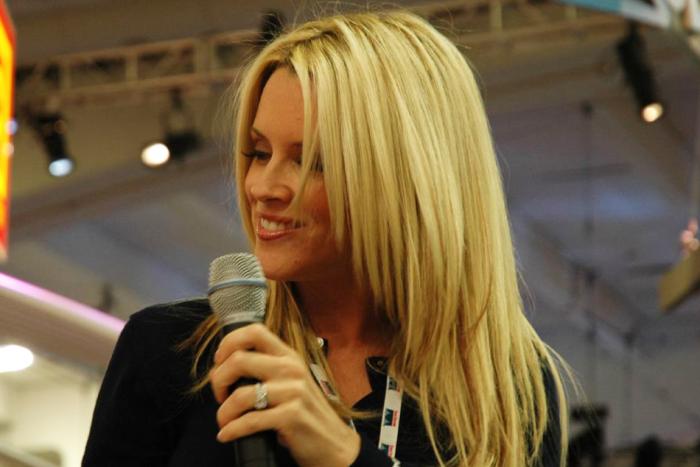“The more the universe is comprehensible,” says American astrophysicist Steven Weinberg, “the more it also seems pointless.” This is either an elegant, koan-like defense of the pursuit of theoretical science as an end in itself, or a public plea on Weinberg’s part for a Xanax refill. In any case, they gave him the Nobel Prize.
But that was 35 years ago, when public money was spent to discover things simply because they hadn’t already been discovered: progress measured as accumulated knowledge.
In the current political climate Weinberg would be the poster boy for the defunding of pure research. Pointless? Call us when the parsing of dark matter and the cosmic background radiation related to the Big Bang creates real, sustainable jobs and promotes a market economy. In the meantime the money is better spent on high-end tax cuts and oil exploration, so we are told.
So how to explain the success of the Fox TV show Cosmos: A Spacetime Odyssey, a giddy, near-Hanna-Barbera celebration of discovery over commerce, which pulled 8.5 million viewers in its series launch this year, the only Top 10 show in the history of television with the word spacetime in its title? In fact, Neil deGrasse Tyson, the host, producer and affable spokesphysicist behind Cosmos has a diplomat’s grasp of modern politics. On the public speaking circuit he is quick to point out the practical implications of space research. For one thing, he told an audience at this year’s South By Southwest Interactive in Austin, space exploration would give us a head’s up on any rogue asteroids that might threaten the earth (an Armageddon of the sort that wiped out the dinosaurs, of course, would be nothing if not counterproductive to the development of American small business and the bootstrap start-ups that drive the modern economy).
He went on to describe space travel as a “long term investment”: “The first trillionaire in the world,” he said, “is going to be the person who first mines the asteroid belt.” In other words, far from being pointless, the universe is in fact resource-rich: NASA estimates the value of iron ore, nickel, platinum, and other NASDAQ-ready commodities in the asteroid belt to be in excess of $100-million for each of the six billion people on earth. There is, in short, more out there than the stuff of pure mathematics and pretty screen-savers from the Hubble telescope. Beyond the tug of Earth’s gravity, it’s the Yukon gold rush meets The Jetsons.
What could possibly go wrong? Only lefty luddite tax-and-spend students of Greek mythology would point out that Icarus burned for his hubris. Besides, scientific research led by venture capitalists has a track record already—in the oil patch, and in factory farming where corn is engineered to carry jellyfish genes. And if there is life on other planets, private, for-profit space study might bring us closer to finding it, if not to advance the understanding of our own origins, then to open up fresh new possibilities for commerce: free and borderless trade.
This is an idea that Ken Kalfus toys with, like a cat with yarn, in his novel Equilateral, which begins, as art often does, with fact, and the distinctly human talent for bending facts to match our own breathless fantasies. In the late 19th century (this is the true part), an Italian astronomer named Giovanni Schiaparelli, while studying Mars through his telescope, discovered features on the red planet in geometric forms that could only be engineered (he decided) by intelligent life: canals, presumably to support working farms. Newspapers ran with the story, other astronomers confirmed his observations, the chattering classes discussed the implications of an agrarian Martian race. Only decades later did technology allow a more banal truth to emerge: the canals were an optical illusion, a telescopic glitch, nourished by wishful thinking. Kalfus’ novel takes place before the bubble bursts, when Schiaparelli’s “discovery” is still fresh and rich with implications.
There is, in short, more out there than the stuff of pure mathematics and pretty screen-savers from the Hubble telescope. Beyond the tug of Earth’s gravity, it’s the Yukon gold rush meets The Jetsons.
With the benefit of a blank cheque from private investors (called the Concession) an English astronomer named Sanford Thayer dreams up a mega-project in the Great Sand Sea of the Libyan desert. Through the paid labour of 900,000 Arab fellahin workers he will build a perfect equilateral triangle, 300 miles on each side, fill it with pitch and petroleum, and on the night of celestial opposition, when Mars and Earth are closest to each other, he will light it on fire. If Schiaparelli is right, and there is intelligent canal-building life on Mars, the Martian astronomers will see the triangle with their own telescopes and draw the obvious conclusion: that there is life on Earth, capable of understanding basic Euclidean geometry. “The Concession’s petroleum use,” writes Kalfus, in faux documentary style, “twenty-two million English barrels pumped from newly discovered fields in Arabia, Mesopotamia, and Persia and transported to the Equilateral by pipeline laid for this purpose, surpasses the total amount that has ever been extracted from the Near East. It will be consumed in a single night. A dozen men have already given their lives for this project, several in harrowing circumstances.”
Obstacles emerge, spiritual and physical. Thayer’s personal secretary, who may be in love with him and vice versa (acute Englishness and professional ethics won’t allow them to press the matter too far), suspects megalomania. At what point does the pursuit of knowledge give way to a blind ambition for finishing the thing at all costs? Meanwhile, nature annoys him. There are features in the landscape, rock formations, which hinder excavation. The engineers suggest skirting around them. Thayer will have none of it. The triangle must be perfect, or else Martian scientists will be left with a dilemma which their critics (Martian critics that is, their own naysayers and skeptics) can too easily exploit: a flawed triangle might be dismissed as a curious but natural phenomenon, a trick of wind and geology. The Equilateral must scream intent or the whole project is a waste. Besides, as Thayer says, “it’s the disregard of the natural landscape that proves man’s intelligence.”
Through creative labour relations (read: some troublemakers are hanged) and negotiations with sultans the thing is built, and, in an operatic scene of comedy and horror, set ablaze. Thayer emerges from the fire singed, hairless, half mad. But at this point the Equilateral is no longer his project. “The interests of the Concession,” says Sir Harry, the man who has bankrolled the whole operation, “are strictly commercial. We have obligations to our shareholders… the Concession has been granted a monopoly on trade with Mars.” A customs house is built at the apex of the triangle and a trade delegation is dispatched to meet the expected mission from afar. They wait, and they wait, with predictable results (this does not give away the ending: another surprise is in store).
Equilateral dramatizes a world in which human progress is marked not by the accumulation of scientific knowledge, but by trade, resource extraction, and profit. In other words, it’s a familiar world, based as it is on an optical illusion. “For better or worse,” said Steven Edwards of the American Association for the Advancement of Science last month, in the New York Times, “the practice of science in the 21st century is becoming shaped less by national priorities or peer-review groups and more by the particular preferences of individuals with huge amounts of money.”
But then that asteroid belt, given existing technology, is close enough to touch, and even the most virtuous could think of a few things to do with $100 million once the mines start operating. It all depends on the Concession’s willingness to share the wealth. Let history guide us on that count, too. After all, the more late capitalism becomes comprehensible, the more it also seems pointless, except for a very few.






